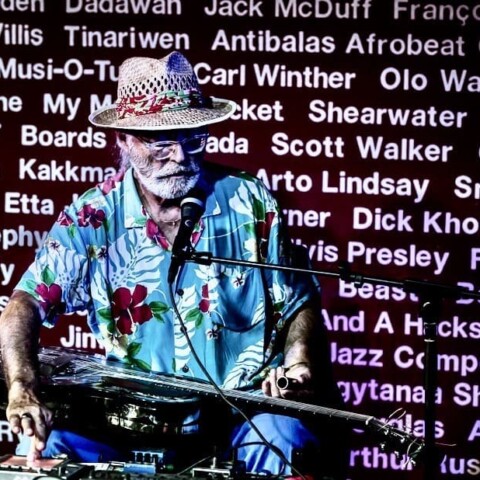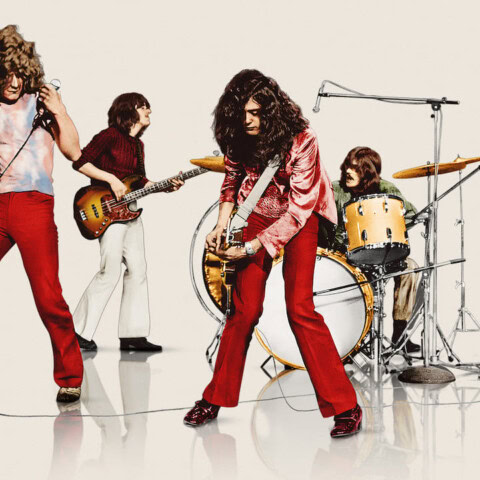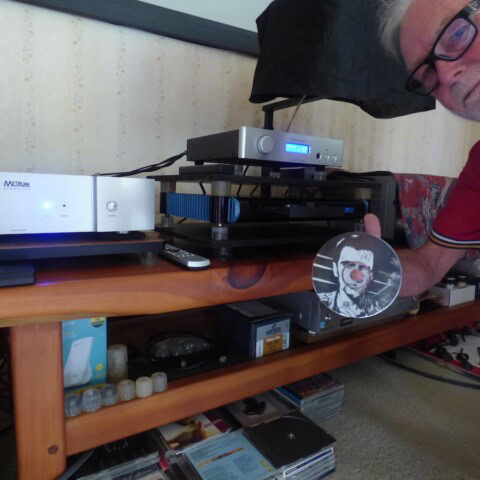Every day in May, to mark NZ Music Month, Gary Steel presents something local from his considerable behind. Personal archive, that is. Today’s surprise item?
Philbo/Low Profile
First published in Wellington City magazine, July 1986.
NOW, WHO IS Philbo? This New Age hippie eschews long locks and tie-dyes for a look pertaining to the reality of a self-contained, well-trained unit. An excellent electric bassist and self-taught conceptualist, this man’s a marvel of inner-sprung nervous energy, prone to manifest itself as an uncoiling yoga-lithe roly-poly across the floor, or an occasional disarming primal yowl.
Strange, but true, and truth is the essence of Phil Bowering – or Philbo, as he shall be referred. A groovy chap.
 His reality is explained in answer to a challenge from this ailing journalist. Isn’t your endless energy simply self-seeking? Huh? “The ultimate purpose of life is to find truth”, he says.
His reality is explained in answer to a challenge from this ailing journalist. Isn’t your endless energy simply self-seeking? Huh? “The ultimate purpose of life is to find truth”, he says.
At which point an unidentified flatmate in another room blasts forth with a massive nasal explosion.
He continues. “The essential truth is ever-present. It never changes. Our conception of what that is changes as we change our perspective.”
Okay. Fair enough. So Philbo’s an accredited cosmic kindofaguy. Don’t write him off. He’s no crank. A bit of Philbohistory, then. But brief: 1970s: jazz and fusion playing and experimentation, music study. 1980: rock band the Protons. 1981/2: Various short-lived or one-off projects. 1983: Introspection culminating in the first Low Profile record, a 6-track EP called Glass Cage. Recorded in Auckland in collaboration with ex-Wellington drummer/engineer Steve Garden and a collection of appropriate session musos, it set the pattern for subsequent Low Profile releases. 1984’s Elephunk In My Soup and zany animated video attachment received praise and sales.
 Financing the project continued to be a problem, and after a stint in Auckland working on an unsuccessful sponsorship bid towards a projected musical/cultural communications scheme, he headed off to try his luck in England and Australia. Philbo returned to New Zealand late last year with the knowledge that this was the place to do it in. The question was how.
Financing the project continued to be a problem, and after a stint in Auckland working on an unsuccessful sponsorship bid towards a projected musical/cultural communications scheme, he headed off to try his luck in England and Australia. Philbo returned to New Zealand late last year with the knowledge that this was the place to do it in. The question was how.
 Involved in several projects since his return, including his long-term Moving Lines experimental outfit, he’s sitting her expounding on and promoting the most immediate Philbo-project, a new Low Profile release. Or a pair, actually. The first is The Cutting Edge, an intoxicating swirl of rhythm, catchy and not difficult, and “about what you must go through to produce something of quality.” Simon Says is the second, and “deals with following trends and a voice of influence with something suspect about it.”
Involved in several projects since his return, including his long-term Moving Lines experimental outfit, he’s sitting her expounding on and promoting the most immediate Philbo-project, a new Low Profile release. Or a pair, actually. The first is The Cutting Edge, an intoxicating swirl of rhythm, catchy and not difficult, and “about what you must go through to produce something of quality.” Simon Says is the second, and “deals with following trends and a voice of influence with something suspect about it.”
“We’ve tried to produce something distinctive that is accessible. There’s a certain energy we’re trying to communicate and a certain polish.”
The problems Philbo has encountered in creating music and unleashing it on the world have forced him to nut-up on the practical side of things: the industry, markets, strategies, planning, corporations. And discipline.
He sees the Low Profile project as the ultimate in “what can be done with incredibly limited resources” and notes that it has been achieved only with “incredible personal sacrifices” because of the lack of support for NZ music. Says Philbo: “It’s another high quality record and whether it catches the public imagination or not is irrelevant to us. In New Zealand we recognise that we’re appealing to a tiny percent of a tiny population.” The object is to export.
“As a composer I want to work in a wide area, recognizing that not all music I do can be channeled through one area. Your product is best put through a channel that’s appropriate for it.” By using all available channels, and creating new ones, “all music is able to reach all the audiences that are interested in it.” Which is what’s not happening now.
 Philbo’s been hankering after corporate investment/sponsorship, and sees this as a way ahead for the industry. “Investment is needed, because in order for people to produce high quality work there must be a support structure of some kind that enables people to maintain a high standard.” While music is by necessity a speculative business, he reckons “if you’ve got a good organisational structure, that alleviates some of the problems that might be involved in getting returns.”
Philbo’s been hankering after corporate investment/sponsorship, and sees this as a way ahead for the industry. “Investment is needed, because in order for people to produce high quality work there must be a support structure of some kind that enables people to maintain a high standard.” While music is by necessity a speculative business, he reckons “if you’ve got a good organisational structure, that alleviates some of the problems that might be involved in getting returns.”
He foresees local music being appreciated here and elsewhere, but the musicians using “New Zealand as a base, because of the quality of life and space… which is the other aspect important in the development of something distinctive.”
His studies of processes have encouraged a respect of big business. “What I respect about corporations is the way they are able to make a profit because of the level of their organisation. The organisation is strong and efficient. The question is what is the ultimate motivation for that corporate structure?”
And he’s got detailed linking charts which combine the ideal with the corporeal and screeds of notes on the biz, including the concept of Flamewave International, a kind of cosmic arts trust which we haven’t the space to write about.
Philbo sees his role as “a facilitator and co-ordinator who has an understanding of processes… to facilitate a certain creative process that involves more and more people.”
It’s not enough, he says, for people to set goals. They have to know the processes necessary to achieve the goals.
He admits that the spirit that pervades Low Profile records possibly isn’t right for the zeitgeist that’s working in 1986. “How do you nurture something that is more subtle, more gentle, something that is more directly in contact with people? The Big is powerful, but it’s not connecting with people on a gentle, emotional level… there’s an imbalance now towards the willful, the rational, the power side.”
Well, it is the year of the tiger. “Yes, but it’s also the International Year Of Peace.” Perhaps they’ll balance each other out. GARY STEEL
Note from the author: I remember one interview I did with Philbo where I was suffering from an excruciatingly sore back. He ‘treated’ me with the energy of his hands, just by hovering them over my back, not actually touching me. Panacea or otherwise, it worked! Low Profile ended up making an album, and competed in the 1987 Music Awards (from memory), but shortly afterwards, Philbo retreated from the music biz. His drummer/producer/engineer, Steve Garden, ended up founding Rattle Records. Last time I heard from Philbo in the late 1990s, he was working on music in the style of his hero Bill Laswell, and teaching music at AUT in New Plymouth. Anyone know what happened to him?
* Don’t forget to check out www.audioculture.co.nz after May 31, where you’ll find a vast repository of NZ music history.
Watch the ‘Elephunk In My Soup’ video here.














